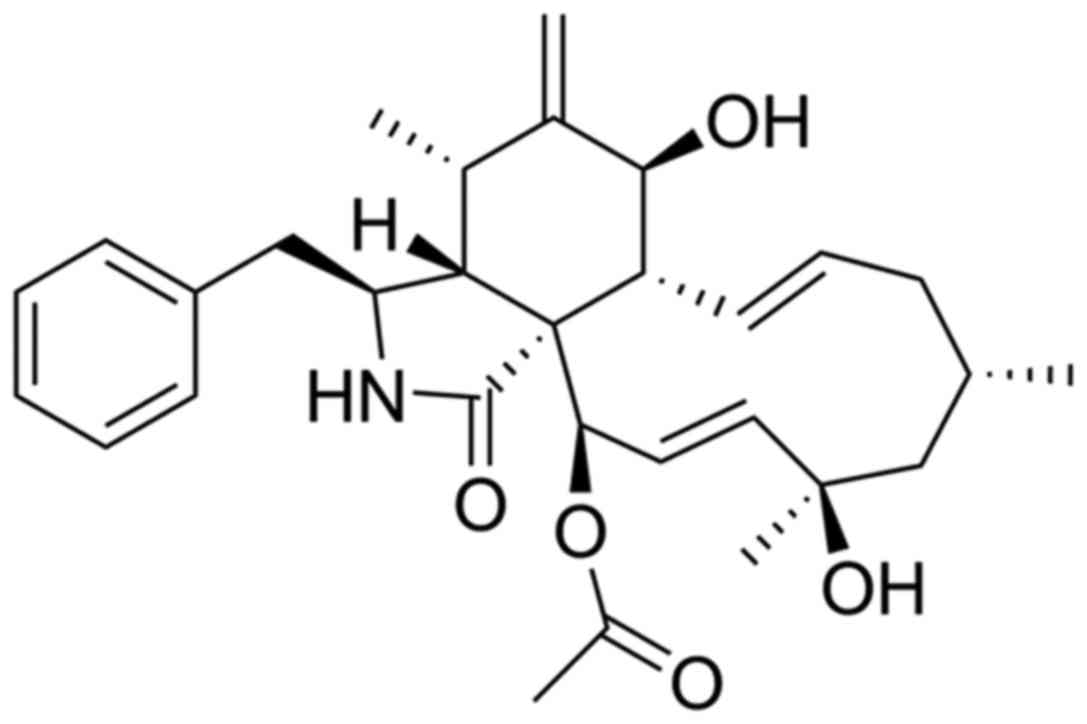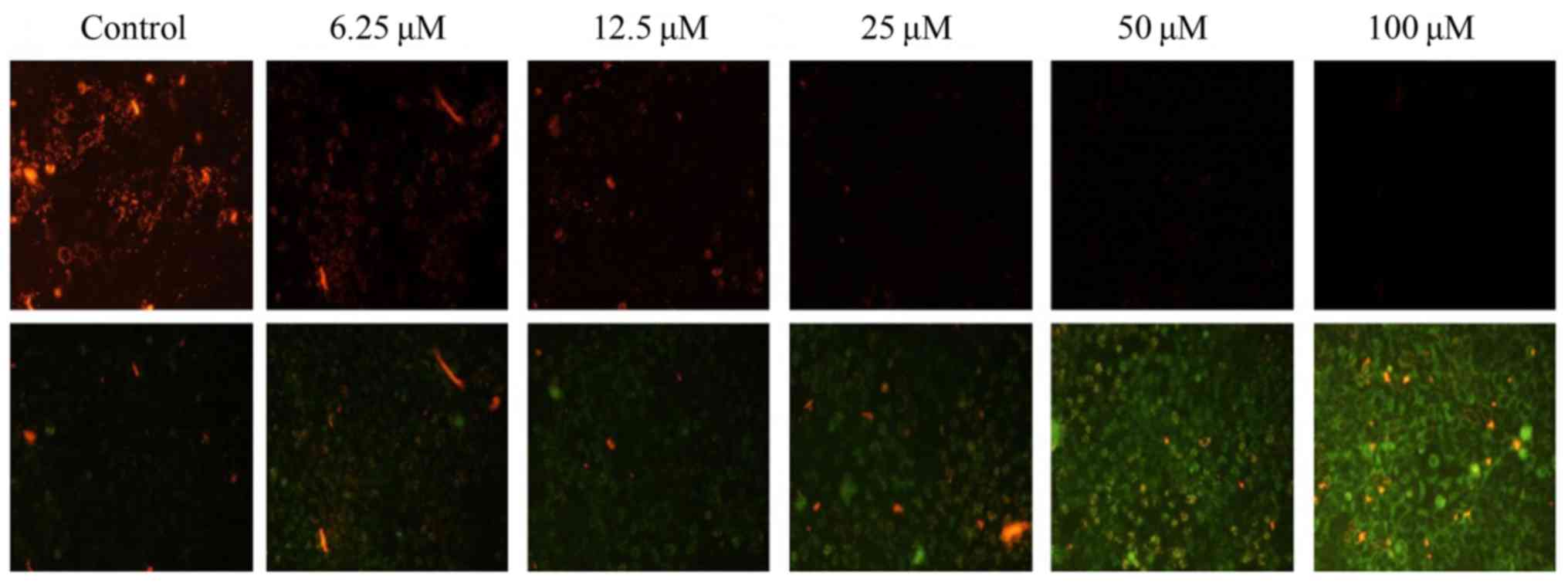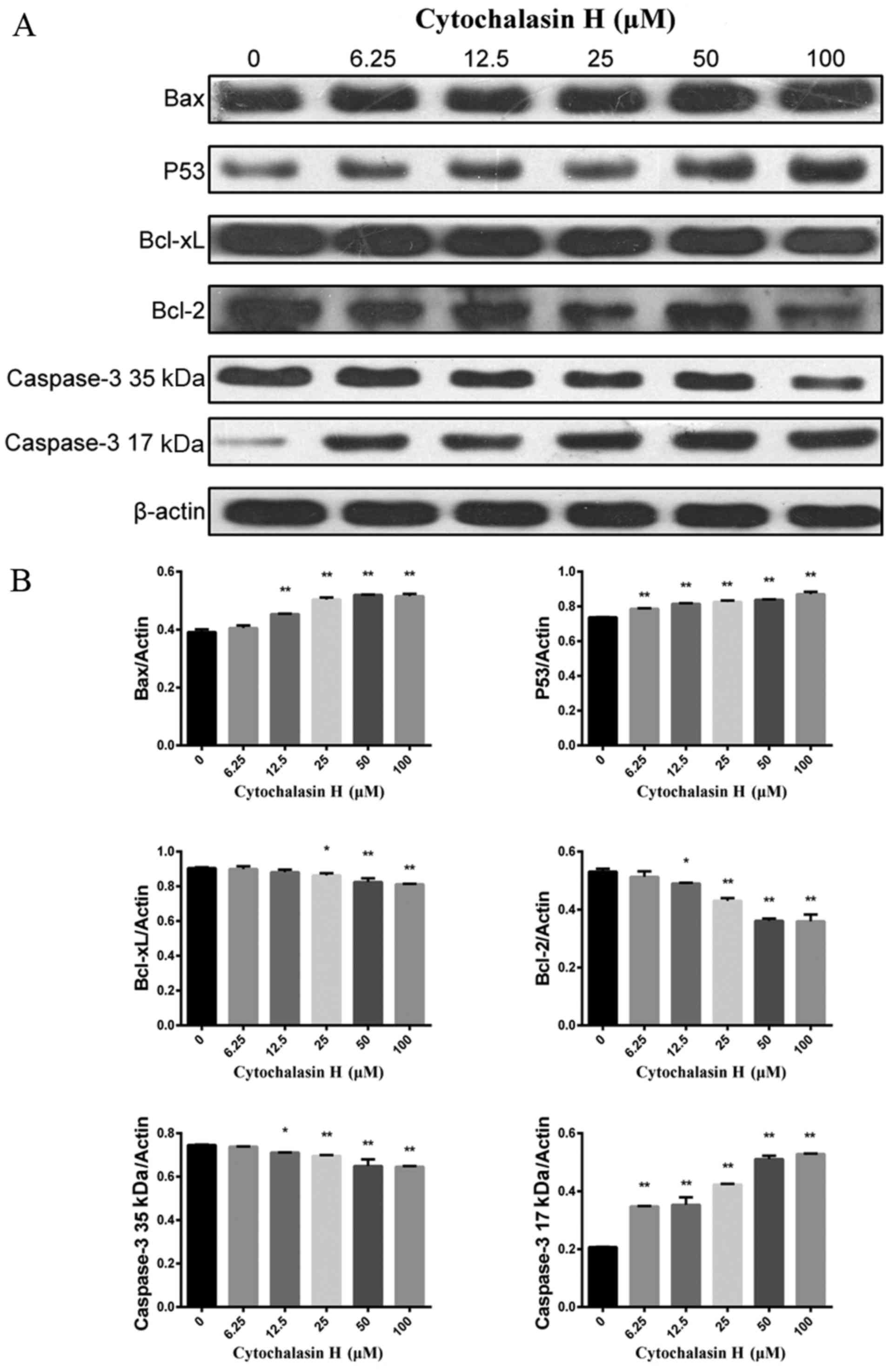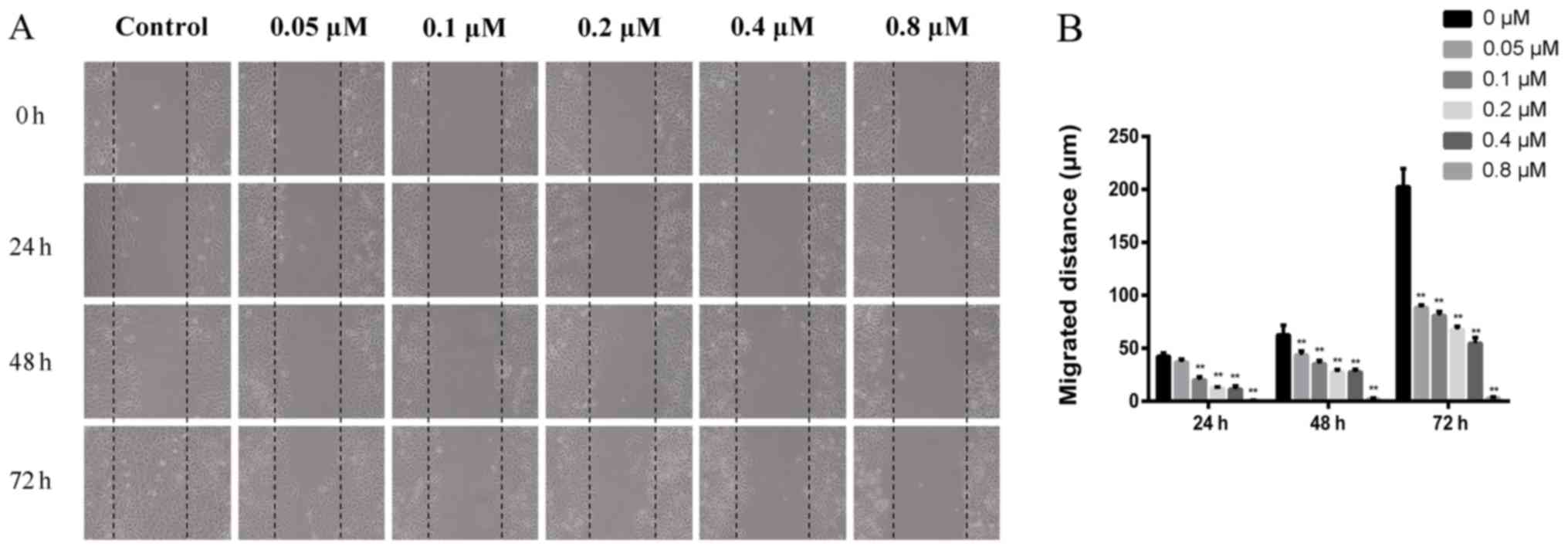|
1
|
Bhavana J, Kalaivani MK and Sumathy A:
Cytotoxic and pro-apoptotic activities of leaf extract of Croton
bonplandianus Baill. against lung cancer cell line A549. Indian
J Exp Biol. 54:379–385. 2016.PubMed/NCBI
|
|
2
|
Ramos-Silva A, Tavares-Carreón F, Figueroa
M, De la Torre-Zavala S, Gastelum-Arellanez A, Rodríguez-García A,
Galán-Wong LJ and Avilés-Arnaut H: Anticancer potential of
Thevetia peruviana fruit methanolic extract. BMC Complement
Altern Med. 17:2412017. View Article : Google Scholar : PubMed/NCBI
|
|
3
|
Velmurugan BK, Yang HH, Sung PJ and Weng
CF: Excavatolide B inhibits nonsmall cell lung cancer proliferation
by altering peroxisome proliferator activated receptor gamma
expression and PTEN/AKT/NF-Kβ expression. Environ Toxicol.
32:290–301. 2017. View Article : Google Scholar : PubMed/NCBI
|
|
4
|
Zhu L, Chen Y, Wei C, Yang X, Cheng J,
Yang Z, Chen C and Ji Z: Anti-proliferative and pro-apoptotic
effects of cinobufagin on human breast cancer MCF-7 cells and its
molecular mechanism. Nat Prod Res. 32:493–497. 2018. View Article : Google Scholar : PubMed/NCBI
|
|
5
|
Kumar Nishanth S, Aravind SR, Jacob J,
Gopinath G, Lankalapalli RS, Sreelekha TT and Kumar Dileep BS:
Pseudopyronine B: A potent antimicrobial and anticancer molecule
isolated from a pseudomonas mosselii. Front Microbiol.
7:13072016. View Article : Google Scholar : PubMed/NCBI
|
|
6
|
Gong B, Liu G, Liao R, Song J and Zhang H:
Endophytic fungus Purpureocillium sp. A5 protect mangrove
plant Kandelia candel under copper stress. Braz J Microbiol.
48:530–536. 2017. View Article : Google Scholar : PubMed/NCBI
|
|
7
|
Cheng MJ, Wu MD, Chan HY, Hsieh SY, Chen
YL, Chen IS, Chan FL, Chen JJ and Yuan GF: Secondary metabolites
produced by Phomopsis sp. 11F0023, an endophytic fungus in
Eragrostis amabilis. Chem Nat Compd. 51:431–434. 2015.
View Article : Google Scholar
|
|
8
|
Bhatia DR, Dhar P, Mutalik V, Deshmukh SK,
Verekar SA, Desai DC, Kshirsagar R, Thiagarajan P and Agarwal V:
Anticancer activity of Ophiobolin A, isolated from the endophytic
fungus Bipolaris setariae. Nat Prod Res. 30:1455–1458. 2016.
View Article : Google Scholar : PubMed/NCBI
|
|
9
|
Ju ZR, Qin X, Lin XP, Wang JF,
Kaliyaperumal K, Tian YQ, Liu J, Liu F, Tu Z, Xu SH, et al: New
phenyl derivatives from endophytic fungus Botryosphaeria sp.
SCSIO KcF6 derived of mangrove plant Kandelia candel. Nat
Prod Res. 30:192–198. 2016. View Article : Google Scholar : PubMed/NCBI
|
|
10
|
Zheng CJ, Huang GL, Xu Y, Song XM, Yao J,
Liu H, Wang RP and Sun XP: A new benzopyrans derivatives from a
mangrove-derived fungus Penicillium citrinum from the South
China Sea. Nat Prod Res. 30:821–825. 2016. View Article : Google Scholar : PubMed/NCBI
|
|
11
|
El-Gendy MM, El-Bondkly AM and Yahya SM:
Production and evaluation of antimycotic and antihepatitis C virus
potential of fusant MERV6270 derived from mangrove endophytic fungi
using novel substrates of agroindustrial wastes. Appl Biochem
Biotechnol. 174:2674–2701. 2014. View Article : Google Scholar : PubMed/NCBI
|
|
12
|
Cai R, Chen S, Liu Z, Tan C, Huang X and
She Z: A new α-pyrone from the mangrove endophytic fungus
Phomopsis sp. HNY29-2B. Nat Prod Res. 31:124–130. 2017.
View Article : Google Scholar : PubMed/NCBI
|
|
13
|
Liu X, Wu X, Ma Y, Zhang W, Hu L, Feng X,
Li X and Tang X: Endophytic fungi from mangrove inhibit lung cancer
cell growth and angiogenesis in vitro. Oncol Rep. 37:1793–1803.
2017. View Article : Google Scholar : PubMed/NCBI
|
|
14
|
El-Hawary SS, Sayed AM, Rateb ME, Bakeer
W, AbouZid SF and Mohammed R: Secondary metabolites from fungal
endophytes of Solanum nigrum. Nat Prod Res. 31:2568–2571.
2017. View Article : Google Scholar : PubMed/NCBI
|
|
15
|
Yahara I, Harada F, Sekita S, Yoshihira K
and Natori S: Correlation between effects of 24 different
cytochalasins on cellular structures and cellular events and those
on actin in vitro. J Cell Biol. 92:69–78. 1982. View Article : Google Scholar : PubMed/NCBI
|
|
16
|
Chapla VM, Zeraik ML, Ximenes VF, Zanardi
LM, Lopes MN, Cavalheiro AJ, Silva DH, Young MC, Fonseca LM,
Bolzani VS, et al: Bioactive secondary metabolites from
Phomopsis sp., an endophytic fungus from Senna
spectabilis. Molecules. 19:6597–6608. 2014. View Article : Google Scholar : PubMed/NCBI
|
|
17
|
Yi JM, Kim J, Park JS, Lee J, Lee YJ, Hong
JT, Bang OS and Kim NS: In vivo anti-tumor effects of the ethanol
extract of gleditsia sinensis thorns and its active
constituent, cytochalasin h. Biol Pharm Bull. 38:909–912. 2015.
View Article : Google Scholar : PubMed/NCBI
|
|
18
|
Tao YW, Lin YC, She ZG, Lin MT, Chen PX
and Zhang JY: Anticancer activity and mechanism investigation of
beauvericin isolated from secondary metabolites of the mangrove
endophytic fungi. Anticancer Agents Med Chem. 15:258–266. 2015.
View Article : Google Scholar : PubMed/NCBI
|
|
19
|
Zhang JY, Tao LY, Liang YJ, Yan YY, Dai
CL, Xia XK, She ZG, Lin YC and Fu LW: Secalonic acid D induced
leukemia cell apoptosis and cell cycle arrest of G(1) with
involvement of GSK-3beta/beta-catenin/c-Myc pathway. Cell Cycle.
8:2444–2450. 2009. View Article : Google Scholar : PubMed/NCBI
|
|
20
|
D'cruz A, Lin T, Anand AK, Atmakusuma D,
Calaguas MJ, Chitapanarux I, Cho BC, Goh BC, Guo Y, Hsieh WS, et
al: Consensus recommendations for management of head and neck
cancer in Asian countries: A review of international guidelines.
Oral Oncol. 49:872–877. 2013. View Article : Google Scholar : PubMed/NCBI
|
|
21
|
Zhang YH, Zhang Y, Li XY, Feng XD, Jian W
and Li RQ: Antitumor activity of the pachymic acid in
nasopharyngeal carcinoma cells. Ultrastruct Pathol. 41:245–251.
2017. View Article : Google Scholar : PubMed/NCBI
|
|
22
|
Evan GI and Vousden KH: Proliferation,
cell cycle and apoptosis in cancer. Nature. 411:342–348. 2001.
View Article : Google Scholar : PubMed/NCBI
|
|
23
|
Chandar N, Billig B, McMaster J and Novak
J: Inactivation of p53 gene in human and murine osteosarcoma cells.
Br J Cancer. 65:208–214. 1992. View Article : Google Scholar : PubMed/NCBI
|
|
24
|
Yoo YD, Park JK, Choi JY, Lee KH, Kang YK,
Kim CS, Shin SW, Kim YH and Kim JS: CDK4 down-regulation induced by
paclitaxel is associated with G1 arrest in gastric
cancer cells. Clin Cancer Res. 4:3063–3068. 1998.PubMed/NCBI
|
|
25
|
Mullan PB, Quinn JE, Gilmore PM,
McWilliams S, Andrews H, Gervin C, McCabe N, McKenna S, White P,
Song YH, et al: BRCA1 and GADD45 mediated G2/M cell
cycle arrest in response to antimicrotubule agents. Oncogene.
20:6123–6131. 2001. View Article : Google Scholar : PubMed/NCBI
|
|
26
|
Bai L and Wang S: Targeting apoptosis
pathways for new cancer therapeutics. Annu Rev Med. 65:139–155.
2014. View Article : Google Scholar : PubMed/NCBI
|
|
27
|
Fisher DE: Apoptosis in cancer therapy:
Crossing the threshold. Cell. 78:539–542. 1994. View Article : Google Scholar : PubMed/NCBI
|
|
28
|
Yi JM, Kim MS, Lee EH, Wi DH, Lee JK, Cho
KH, Hong SH and Kim HM: Induction of apoptosis by Paljin-Hangahmdan
on human leukemia cells. J Ethnopharmacol. 88:79–83. 2003.
View Article : Google Scholar : PubMed/NCBI
|
|
29
|
Saadat Rahbar Y, Saeidi N, Vahed Zununi S,
Barzegari A and Barar J: An update to DNA ladder assay for
apoptosis detection. Bioimpacts. 5:25–28. 2015. View Article : Google Scholar : PubMed/NCBI
|
|
30
|
Chen C, Hu SY, Luo DQ, Zhu SY and Zhou CQ:
Potential antitumor agent from the endophytic fungus
Pestalotiopsis photiniae induces apoptosis via the
mitochondrial pathway in HeLa cells. Oncol Rep. 30:1773–1781. 2013.
View Article : Google Scholar : PubMed/NCBI
|
|
31
|
Kralj M, Husnjak K, Körbler T and Pavelić
J: Endogenous p21WAF1/CIP1 status predicts the response of human
tumor cells to wild-type p53 and p21WAF1/CIP1 overexpression.
Cancer Gene Ther. 10:457–467. 2003. View Article : Google Scholar : PubMed/NCBI
|
|
32
|
Chipuk JE and Green DR: Dissecting
p53-dependent apoptosis. Cell Death Differ. 13:994–1002. 2006.
View Article : Google Scholar : PubMed/NCBI
|
|
33
|
Danial NN and Korsmeyer SJ: Cell death:
Critical control points. Cell. 116:205–219. 2004. View Article : Google Scholar : PubMed/NCBI
|
|
34
|
Chipuk JE and Green DR: How do BCL-2
proteins induce mitochondrial outer membrane permeabilization?
Trends Cell Biol. 18:157–164. 2008. View Article : Google Scholar : PubMed/NCBI
|
|
35
|
Besbes S, Mirshahi M, Pocard M and Billard
C: New dimension in therapeutic targeting of BCL-2 family proteins.
Oncotarget. 6:12862–12871. 2015. View Article : Google Scholar : PubMed/NCBI
|
|
36
|
Boatright KM and Salvesen GS: Mechanisms
of caspase activation. Curr Opin Cell Biol. 15:725–731. 2003.
View Article : Google Scholar : PubMed/NCBI
|
|
37
|
Tait SW and Green DR: Mitochondria and
cell death: Outer membrane permeabilization and beyond. Nat Rev Mol
Cell Biol. 11:621–632. 2010. View Article : Google Scholar : PubMed/NCBI
|
|
38
|
Erşahin M, Çevik Ö, Akakın D, Şener A,
Özbay L, Yegen BC and Şener G: Montelukast inhibits caspase-3
activity and ameliorates oxidative damage in the spinal cord and
urinary bladder of rats with spinal cord injury. Prostaglandins
Other Lipid Mediat. 99:131–139. 2012. View Article : Google Scholar : PubMed/NCBI
|
|
39
|
Wang X, Tan T, Mao ZG, Lei N, Wang ZM, Hu
B, Chen ZY, She ZG, Zhu YH and Wang HJ: The marine metabolite
SZ-685C induces apoptosis in primary human nonfunctioning pituitary
adenoma cells by inhibition of the Akt pathway in vitro. Mar Drugs.
13:1569–1580. 2015. View Article : Google Scholar : PubMed/NCBI
|
|
40
|
Gulhati P, Bowen KA, Liu J, Stevens PD,
Rychahou PG, Chen M, Lee EY, Weiss HL, O'Connor KL, Gao T, et al:
mTORC1 and mTORC2 regulate EMT, motility, and metastasis of
colorectal cancer via RhoA and Rac1 signaling pathways. Cancer Res.
71:3246–3256. 2011. View Article : Google Scholar : PubMed/NCBI
|
|
41
|
Liang CC, Park AY and Guan JL: In vitro
scratch assay: A convenient and inexpensive method for analysis of
cell migration in vitro. Nat Protoc. 2:329–333. 2007. View Article : Google Scholar : PubMed/NCBI
|
|
42
|
Yarrow JC, Perlman ZE, Westwood NJ and
Mitchison TJ: A high-throughput cell migration assay using scratch
wound healing, a comparison of image-based readout methods. BMC
Biotechnol. 4:212004. View Article : Google Scholar : PubMed/NCBI
|




















